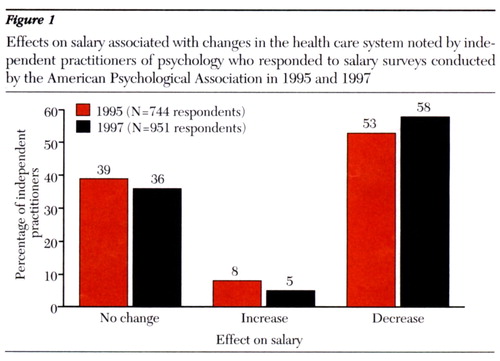Datapoints: Changes in Salaries of Independent Practitioners of Psychology
The 1997 American Psychological Association salary survey examined how the salaries of independent practitioners of psychology—licensed, doctoral-level psychologists in individual private practice or in group psychological or medical practice—had changed over the previous year as a result of the expansion of managed care and other changes in the health care system.
The salary survey, conducted every two years by the research office of the American Psychological Association, is sent to a stratified random sample of 20,000 APA members. The overall response rate for 1997 was 42 percent. A total of 951 independent practitioners of psychology responded to the survey question about salary shifts associated with changes in the health care system.
More than half of the independent practitioners who responded to the question (58 percent, or 554 psychologists) reported a salary decrease in 1997. The average decrease was 17 percent. Fifty-nine percent of practitioners in individual practice and 57 percent of group practitioners reported decreases in salary; the decreases averaged 19 percent and 15 percent, respectively. Only 5 percent of the respondents, or 51 practitioners, reported a salary hike—an average increase of 24 percent—that they attributed to health care reform. Individual practitioners had a higher average percentage increase compared with group practitioners (26 percent versus 20 percent). Finally, 36 percent of practitioners (N=346) reported that their salaries were not affected by health care reform.
Figure 1 compares data from the 1997 salary survey with data from the 1995 survey (1). The proportion of practitioners noting a negative effect on salaries of changes in the health care system was somewhat higher in 1997 than 1995. The proportions indicating no change or increases did not change substantially between 1995 and 1997.
The average percentage decrease in salary varied by only 1 percent between the two surveys, from 18 percent in 1995 to 17 percent in 1997. However, the average percentage increase in salary was 10 percent, a change from 14 percent in 1995 to 24 percent in 1997.
Overall, changes in the health care system have had more of a negative than a positive impact on salaries of psychologists in independent practice, and this trend continued in 1997. The data reported for average salary increases should be interpreted cautiously because the number of respondents was small. Readers also should be aware that the data on salary changes are based on respondents' perceptions and that they were not derived from statistical comparisons of the actual yearly salaries. Furthermore, these data are based on respondents' attributions of salary shifts to changes in the health care system, not on an actual causal link per se.
Dr. Williams, a psychologist, is the senior research associate of the research office of the American Psychological Association, where Dr. Kohout is director and Ms. Wicherski is a research consultant. Send correspondence to Dr. Kohout, APA Research Office, 750 First Street, N.E., Washington, D.C. 20002. Harold Alan Pincus, M.D., and Terri L. Tanielian, M.A., are coeditors of this column.

Figure 1. Effects on salary associated with changes in the health care system noted by independent practitioners of psycology who responded to salary surveys conducted by the American Pschological Association in 1995 and 1997
1. Kohout JL, Wicherski M: Changes in psychologists' salaries. Psychiatric Services 48:467, 1997Link, Google Scholar



